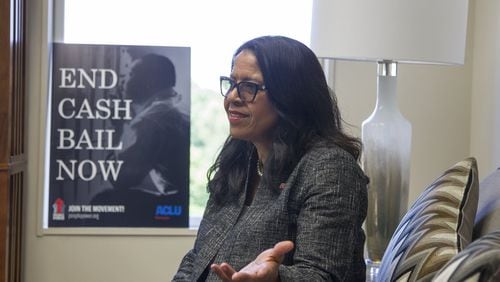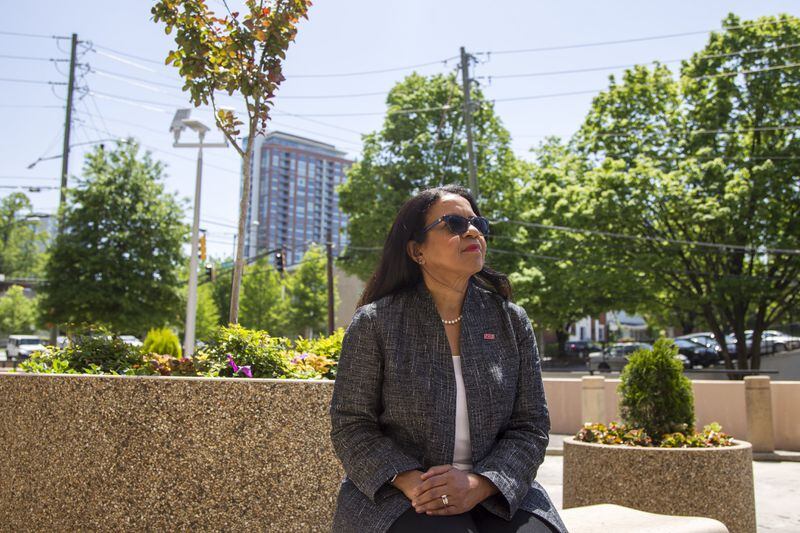In recent years, the American Civil Liberties Union was more of a political punching bag than a force in Georgia.
Reviled by some as lefty troublemakers and revered by others, the civil rights organization struggled to make a difference in the state, where it lacked much influence on voting rights and free speech.
That’s not the case anymore.
The American Civil Liberties Union of Georgia has racked up repeated wins this year both at the Capitol and in the courts.
The ACLU successfully lobbied the Republican-controlled Georgia General Assembly to squelch an immigration enforcement bill, reduce cash bail for defendants who can't afford it and preserve "souls to the polls" advance voting on Sundays.
Meanwhile, the organization used the threat of lawsuits to prevent voters from being declared inactive, allow protesters to wave signs in the Capitol and stop elected officials from censoring comments on their public Facebook pages.
The election of President Donald Trump in November 2016 fueled the ACLU’s rise to prominence nationally and locally, said Andrea Young, the executive director of the ACLU of Georgia. Up until then, she said the group was largely “stagnant” in Georgia.
After the election, the ACLU’s membership and income surged, tripling to about 22,000 members and $1.5 million in annual revenue in Georgia, she said. Nationwide, the ACLU used Trump’s election to mobilize voters who feared a ban on Muslim immigration, a loss of abortion rights, limits on minority voting access and discrimination based on sexual orientation.
“We call it the Trump bump,” said Young, who took leadership of the organization’s Georgia chapter in January 2017. “People woke up the next morning and were very concerned about the future of the country.”
The ACLU’s newfound resources allowed it to grow its staff in Georgia from two employees to 11, including three attorneys, a lobbyist and a communications director.
Critics of the ACLU such as Georgia Secretary of State Brian Kemp, a Republican candidate for governor, said the organization is a politically motivated tool of liberals.
“They’ll continue to come at us to undermine the values we have in Georgia and hope we give in,” Kemp said. “It’s a problem because it’s expensive for taxpayers when they have to defend these lawsuits. The ACLU knows I’m going to stand up and fight. That makes them angry.”
Kemp agreed to settle an ACLU lawsuit in February that alleged the state was violating voters' rights by declaring them "inactive" when they failed to confirm their addresses after moving within the same county. The settlement calls for those voters to be kept on active status but allows Kemp to continue broader voter list maintenance practices.
In response to a separate ACLU complaint, Kemp's office consented to change voter registration forms that asked new voters to attach proof of identification. The ACLU said that language misrepresented federal election law that doesn't require identification until voters first cast a ballot.
While the ACLU calls itself a nonpartisan group, it often supports causes that are associated with Democrats, such as the rights of minorities and criminal defendants. Young is the daughter of Andrew Young, a former mayor of Atlanta and ambassador to the United Nations.
Still, the ACLU reaches across party lines by rooting its arguments in principles of democracy and fundamental rights, she said. The organization combines the power of persuasion with the possibility of tough court battles.
“We start with the position that we’re defenders of the Constitution,” Young said. “We always have the implied big stick that, yes, we will sue you.”
While the ACLU's aggressive advocacy was effective, state Sen. Josh McKoon said it prevented legislation from passing despite broad support among Republicans who control nearly two-thirds of the state Legislature.
For example, the ACLU fought bills to make English the state's official language and to seek deportation of immigrants who entered the country without authorization.
“It’s very frustrating,” said McKoon, a Republican from Columbus who is running for secretary of state. “The fact that you can’t get a bill moved that clearly enjoys the support of a wide swath of the Republican Party is disappointing.”
The ACLU gained credibility by defending the free speech of those with unpopular views, Young said.
It filed a lawsuit on behalf of controversial right-wing writer Milo Yiannopoulos in Washington, and the organization's Georgia branch sent a letter defending Bartow County students who allegedly were forced to participate in the national school walkout against gun violence March 14.
The organization can call on its thousands of engaged members in Georgia to write letters, make phone calls and testify at legislative hearings.
"To be successful, politicians aren't considered permanent friends or permanent enemies," said Larry Pellegrini, a supporter of the ACLU and executive director of the Georgia Rural Urban Summit, a liberal advocacy group. "That's an important way to get results at the Capitol, by talking about the facts of a bill and how it affects people."
That said, the ACLU isn’t afraid of making enemies.
The organization has threatened legal action against sheriff's departments across the state for allegedly planning a training course on Islam and violating the rights of poor defendants.
Several lawmakers and law enforcement agencies received letters from the ACLU protesting their practice of deleting negative comments from Facebook posts.
After state Sen. John Albers received an ACLU warning letter last month, he changed his Facebook page to make clear it was a personal page and not a public forum. He replaced a cover photo that listed his title and district with a picture of his family, and the page now includes a note telling readers "this is my personal page."
“Whether it be individuals or the ACLU, I’m not going to buy into their foolishness” on Facebook, said Albers, a Republican from Roswell. “Candidly, I don’t really pay attention to the ACLU. Their values are inconsistent with most Georgians.”
Even so, lawmakers can be convinced, said Sean Young, the legal director for the ACLU of Georgia.
The ACLU presents the facts and the law so that lawmakers can make intelligent policy choices they can defend to their constituents, said Young, who is not related to Andrea Young.
“Ultimately, we don’t want to just change government policy, and we don’t want to just win in the courtroom,” he said. “We want to win in the court of public opinion because the people need to be engaged in the issues that are facing us every day.”
The ACLU’s legislative successes
- Supported reducing or eliminating cash bail for those who can't afford to pay it, one of Republican Gov. Nathan Deal's priorities
- Sought an expansion of the state's medical marijuana law to cover post-traumatic stress disorder and chronic pain
- Opposed an immigration enforcement bill that would have required Georgia judges to determine whether defendants are legally in the country
- Fought legislation that would have allowed faith-based adoption agencies to turn away gay couples
- Lobbied lawmakers to reject a bill that would have limited voting on Sundays









